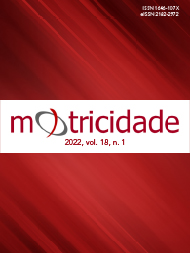Recomendações para a Avaliação e Prescrição de Treino da Força em Indivíduos com Dificuldade Intelectual e Desenvolvimental: Revisão Narrativa
DOI:
https://doi.org/10.6063/motricidade.22470Palavras-chave:
Avaliação da Força, Dificuldade Intelectual e Desenvolvimental, Programa de Exercício Físico, Treino da Força, SaúdeResumo
Existem diversos benefícios através da realização de programas de exercício físico (EF) em indivíduos com Dificuldade Intelectual e Desenvolvimental (DID), no entanto a literatura apresenta uma escassez na implementação e um reduzido número de estudos com metodologias e tipos de treino muito diversos. Intervenções de curto prazo, número reduzido de estudos longitudinais, lacunas metodológicas e métodos de treino inapropriados, dificultam conclusões mais explícitas e consensuais ao nível da prescrição e dos seus resultados. Contudo, os programas de EF, em particular, o treino da força (TF) que tem sido associado à diminuição do risco de aparecimento de doenças cardiovasculares e metabólicas, pode ser uma mais-valia para o indivíduo com DID, atendendo à prevalência de diversas comorbilidades, nomeadamente hipertensão, colesterol e diabetes tipo II. O presente estudo tem por objetivo identificar os aspetos fundamentais e estruturantes para a prescrição de TF, nomeadamente os métodos de avaliação, intensidade, duração, frequência, exercícios adequados e a sua relação com os resultados, através da metodologia com recurso à revisão narrativa, partindo da caracterização de vários programas de TF implementados em indivíduos com DID. Os resultados são apresentados sob a forma de recomendações para a avaliação e prescrição de programas de TF, na população com DID.
Palavras-chaves: Avaliação da Força, Dificuldade Intelectual e Desenvolvimental, Programa de Exercício Físico, Treino da Força, Saúde
Downloads
Publicado
Edição
Secção
Licença
Os autores dos manuscritos submetidos para publicação deverão ceder, a título integral e permanente, os direitos de autor (copyright) à revista Motricidade e às Edições Sílabas Didáticas. A cedência de direitos de autor permite a publicação e divulgação do artigo em formato impresso ou eletrónico e entrará em vigor a partir da data de aceitação do manuscrito. Os autores concedem, ainda, os direitos para a revista Motricidade utilizar e explorar o respetivo artigo, nomeadamente para licenciar, ceder ou vender o seu conteúdo a bases de resumos/indexação ou outras entidades.
Nos termos da licença “Creative Commons”, os autores poderão reproduzir um número razoável de exemplares para uso pessoal ou profissional, mas sem fins comerciais. Nos termos da licença SHERPA/RoMEO, os autores poderão, ainda, disponibilizar/arquivar uma cópia digital final (versão postprint) do artigo no seu website ou no repositório científico da sua instituição.


